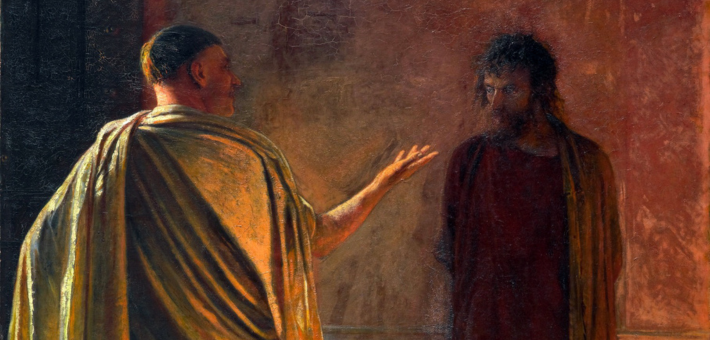Commentary on Revelation 1:4b-8
The opening verses of Revelation are perfectly suited to Christ the King Sunday, affirming our conviction that God has indeed given Jesus the name before which all creatures will bow in reverent submission, proclaiming Jesus the “ruler of the kings of the earth” (1:5), and summoning our own allegiance to Jesus above every earthly power or party insofar as we have become the “kingdom” over which he rules on God’s behalf (1:6).
The lectionary quite intentionally, but somewhat unfortunately, eliminates the first half of Revelation 1:4: “John to the seven assemblies in Asia.” While they are perhaps not critical to the proclamation of the message of verses 4b–8 in isolation, they are, hermeneutically speaking, potentially the most important words in the book. A great deal of fruitless speculation and misleading commentary could have been avoided by giving proper weight to the fact that John wrote his book “specially for the benefit of certain people who were living at that time [and, one might add, in the specific context of the Roman province of Asia] and for the purpose of being understood by them.”1
The God who self-identified as “the one who is” in Exodus 3:14 is here twice identified more fulsomely as “the one who is, the ‘he was,’ and the one who is coming” (verses 4, 8). This is not merely an ontological statement about God’s eternity, as the line in the beloved hymn, “Holy, Holy, Holy,” suggests (“which wert and art and evermore shalt be”). It is, rather, a statement, as John goes on to narrate in the drama that follows, about God’s forthcoming invasion of the “kingdom of this world” (Revelation 11:15), to take its reins for God’s own self and God’s anointed one. God “is coming”—“and he shall reign forever and ever” (Revelation 11:15). From beginning to end, John calls his audiences to live with this future invasion in view.
It is difficult for readers steeped in the Trinitarian formulas of Christian liturgy to avoid conflating “the seven spirits” (1:4; see also 4:5; 5:6) with the Holy Spirit, whom John does nevertheless refer to in the singular throughout his work. A strong case can be made that John has in mind the seven angels of the presence known from other Jewish texts (for example, Testament of Levi 3:5–6; Tobit 12:15) and who appear again in Revelation 8:2.
The focus of this opening greeting of grace, however, is Jesus Christ. As the “faithful witness,” Jesus provides the pattern of boldness that John would have all his addressees follow in their own witness to one and only one God worthy of worship and obedience. Such witness will always be costly, as it was for Jesus himself, but as “the firstborn from the dead” Jesus also gives assurance that his many sisters and brothers whose witness costs them their lives will emerge victorious on the other side of death. And there are many Christians throughout the Majority World, bearing their costly witness, to whom this promise speaks powerfully and directly.
While Jesus Christ is “the ruler of the kings of the earth,” John does not offer a narrative in which these kings exercise their authority in deference to Christ as their ruler. Rather, he offers one in which they exercise their authority on behalf of the greater cosmic forces at the head of a rebellion against God. It is a world in revolt, a narrative in which the “ruler of the kings of the earth” comes to suppress this revolt and establish a new ordering of human life that does reflect God’s good purposes for human beings in community. If nothing else, John’s voice calls the church to scrutinize political rulers and their agendas more carefully for signs of this rebellion rather than lend facile support and religious legitimation to them and their programs.
Christ the King Sunday in 2024 arrives just as the people of the United States recover from another presidential election season. Some woke up the morning after election day and greeted the results with great relief and hope for the nation; others woke up sure that the nation is on the road to moral collapse. Every Christ-follower, however, already had and continues to have a king.
Christ the King Sunday reminds us, as we look back perhaps with some embarrassment at how we allowed ourselves to be caught up in support for one or another temporary candidate as if the salvation of the nation depended on it (and how we maligned those who promoted the other as if they were enemies of the state), that we are called to serve a very different—but still genuinely political—agenda.
We have been loved and redeemed (and this at significant personal cost; 1:5) in order to throw ourselves fully behind the agenda of God and God’s kingdom (verse 6), to commit ourselves fully to practice what the one whom we call “Lord” instructs—and in doing so, to become living witnesses to a different kind of community that plays by the rules and embodies the values of no particular temporal party, but one that plays by the rules and embodies the values of the God and the Messiah “to whom belong the glory and the power” not merely for the next election cycle, but “into the ages of ages” (verse 6).
Following his opening grace greeting (verses 4-6), one can almost hear John shout out, so as to startle his hearers, “Look! He is coming with the clouds!” (verse 7). Many of us wrestle with the temptation to set aside as unenlightened a tenet of the creeds that the church has embraced and affirmed since the fourth century: “He will come again in glory to judge the living and the dead.”
As we proclaim that “God is love” (1 John 4:7), we can find ourselves embarrassed by texts that speak of that coming day as a “day of wrath” (Dies irae, dies illa!). Nevertheless, Revelation continues to be read aloud in the church to remind us also of the salutary effects of retaining sufficient fear in regard to that day that we live every day with a view to what will show the honor and awe in which we hold the one who will be our judge—through our obedience to his word and alignment with both his justice and his holiness here.
Notes
- Arthur Wainwright, Mysterious Apocalypse: Interpreting the Book of Revelation (Nashville: Abingdon, 1993), 138, quoting Johann Jacob Wettstein.


November 24, 2024